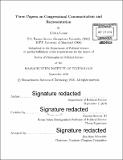| dc.contributor.advisor | Charles Stewart, III. | en_US |
| dc.contributor.author | Loose, Krista (Krista M.) | en_US |
| dc.contributor.other | Massachusetts Institute of Technology. Department of Political Science. | en_US |
| dc.date.accessioned | 2017-03-20T19:39:01Z | |
| dc.date.available | 2017-03-20T19:39:01Z | |
| dc.date.copyright | 2016 | en_US |
| dc.date.issued | 2016 | en_US |
| dc.identifier.uri | http://hdl.handle.net/1721.1/107538 | |
| dc.description | Thesis: Ph. D., Massachusetts Institute of Technology, Department of Political Science, 2016. | en_US |
| dc.description | Cataloged from PDF version of thesis. | en_US |
| dc.description | Includes bibliographical references (pages 125-134). | en_US |
| dc.description.abstract | This project evaluates how elected officials communicate with their constituents and whether voters can tell if their interests are being represented. Specifically, I examine whether political communication strategies may inadvertently lead to suboptimal representation. In my first paper, I evaluate whether members of Congress use criticism of Congress as a means to connect with their constituents, using approximately 10,000 campaign advertisements aired throughout the 2000s. In both this observational evidence and through an original experimental study, I show that when members criticize Congress, this message has little impact on attitudes toward Congress in general or the member in particular. However, survey respondents view a member who criticizes Congress as more "like them," potentially introducing a distracting valence issue into elections. In my second paper, I find clear evidence that legislative behavior does not change as a consequence of the rise or fall of military presence in a district. However, members' communication with their constituents does change. Members who gain bases are more likely to emphasize military issues in their emails than they were prior to the redistricting, while those who lose bases reduce their mentions of military-related subjects. While members are not lying about their work in Congress, they are nonetheless painting a misleading picture of the scope of their efforts on behalf of district interests. In my third paper, I show that, despite incentives not to mention other politicians, members of Congress do talk about their peers in DC in about 30 percent of their political communications. I claim this is a means of ideological signalling, where members cite others who share their ideological space. Additionally, I demonstrate through a series of survey experiments that the public makes reasoned judgments about the ideology of a member who talks about another politician. Members thus have the opportunity to shape how constituents view their representative through references to other politicians. In these three papers, I show that members can use sometimes subtle techniques to influence their relationship with the district. | en_US |
| dc.description.statementofresponsibility | by Krista Loose. | en_US |
| dc.description.tableofcontents | Talking about congress: the limited effect of congressional advertising on congressional approval -- representing their former district: do members do it and do they admit it? -- Politicians as positions: citing others as a cue to ideology. | en_US |
| dc.format.extent | 134 pages | en_US |
| dc.language.iso | eng | en_US |
| dc.publisher | Massachusetts Institute of Technology | en_US |
| dc.rights | MIT theses are protected by copyright. They may be viewed, downloaded, or printed from this source but further reproduction or distribution in any format is prohibited without written permission. | en_US |
| dc.rights.uri | http://dspace.mit.edu/handle/1721.1/7582 | en_US |
| dc.subject | Political Science. | en_US |
| dc.title | Three papers on congressional communication and representation | en_US |
| dc.title.alternative | 3 papers on congressional communication and representation | en_US |
| dc.type | Thesis | en_US |
| dc.description.degree | Ph. D. | en_US |
| dc.contributor.department | Massachusetts Institute of Technology. Department of Political Science | |
| dc.identifier.oclc | 974493462 | en_US |

